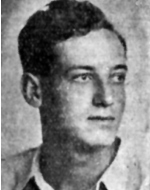Penn, Eldad
Son of Esther and the painter Abel Penn, was born on January 1, 1928 in Jerusalem. From the age of three he lived for three years with his parents abroad. Visited a kindergarten and elementary school in Switzerland and France. He graduated from the Hebrew Gymnasium in Jerusalem and was a counselor in the Scouts Association. Eldad was a man of emotion and thought, and all his life he was preoccupied with the problems of the public and the individual. He was gifted with outstanding literary talent, wrote stories, feuilletons, and kept a diary in which his original personality and his independent attitude toward society were revealed. When he was seventeen and a half, he wrote in his diary: “Life itself is of little value, if one does not dedicate it to a sacred and precious purpose, higher than life, for which they must be sacrificed.” After completing his studies, he went on a training program, first at Kibbutz Beit Hashita and then at Kibbutz Ein Gev. In his training he took part as a member of the Palmach, in the defense of the Upper Galilee – Kibbutz Ein Gev and Kibbutz Ein Zeitim, and since his personal outlook on life did not identify with the collective life in the kibbutz. He participated as a fighter and in the context of the battles for the Ma’aleh Hahamisha and Neve Ilan teams and in the attack on Mount Castel. He was recently among the convoy’s escorts to Gush Etzion. On the way back to Jerusalem, the convoy was attacked near Nebi-Daniel, and during the miracle Eldad managed to return to Gush Etzion. However, in the last attack on the bloc by the Legion on Wednesday, May 13, 1948, Eldad fell in one of the positions in the Kfar Etzion group, a member of the battle who survived among the last defenders of Kfar Etzion, saying that the last things she heard from him were: On May 17, 1949, he was transferred with all the fallen of Gush Etzion to eternal rest in the military cemetery on Mount Herzl in Jerusalem, and in May 1951 he appeared in the ” Massada “book:” Lieutenant Eldad Penn – a collection of writings “.
